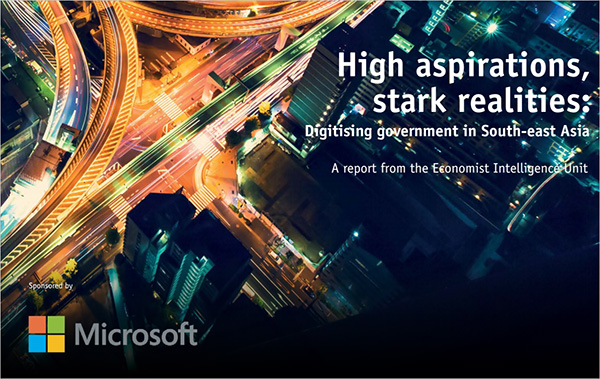
A new report released today by The Economist Intelligence Unit finds that sub-par hardware, manpower shortages and poor data-sharing are hampering uptake of cutting-edge technology by the governments of Indonesia, Malaysia, the Philippines, Singapore and Thailand.
A new report released today by The Economist Intelligence Unit finds that sub-par hardware, manpower shortages and poor data-sharing are hampering uptake of cutting-edge technology by the governments of Indonesia, Malaysia, the Philippines, Singapore and Thailand.
 |
The “High aspirations, stark realities: Digitising government in South-East Asia” report is based on a survey of 300 technology-sector leaders as well as interviews with experts in industry, government, academia and the civic sector. It is sponsored by Microsoft.
The report finds that better use of data, including cloud access and manipulation, is high on respondents’ list of priorities. They also have high hopes for the Internet of Things, in which everyday objects communicate with each other and central servers, facilitating everything from traffic flows to flood control. Yet 46 per cent of survey respondents in government say lack of skills among public-sector workers is the top barrier to greater utilisation of technology, while 44 per cent working in the technology sector point to organisational ICT infrastructure.
“Organisational challenges have overtaken security concerns for governments in Southeast Asia as they seek to deliver more and more services digitally. Governments in the region have an opportunity to stand at the forefront of smart-government development, but only if it addresses real challenges related to employee and citizen ICT skills, and insufficient infrastructure,” Charles Ross, the editor of the report, said.
Regional variations show surprising gaps in perception. Only 20 per cent of Singaporean respondents believe their government is “very effective” at implementing new technologies. This compares to 57 per cent of Indonesian respondents and 33 per cent overall. This illustrates the challenge in fulfilling the ever-advancing needs of savvy users. Singaporeans, long used to near-unlimited Internet access and robust services, likely have far higher expectations of their government than users in less-developed markets, for whom mere connectivity is often a major leap forward.
Given the number of high-profile cyber-attacks around the world, it is somewhat surprising that only a small minority (16 per cent) of Southeast Asian governments consider cyber-security a barrier to public-sector technology adoption. The research found that private clouds which isolate sensitive information from public clouds are one reason security concerns have been alleviated.

 Previous page
Previous page Back to top
Back to top







